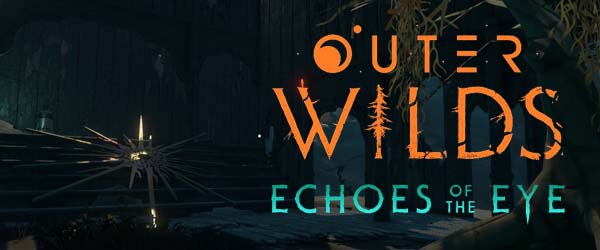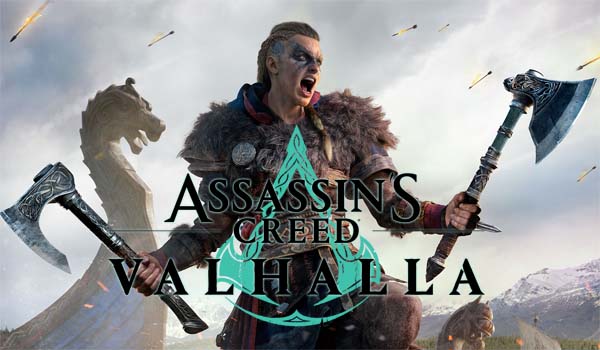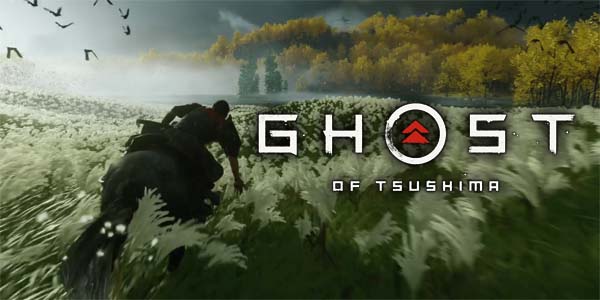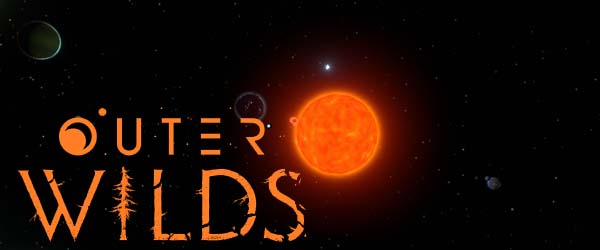
When I played it last year (after waiting over a year for its timed Epic Store exclusivity to end), Outer Wilds quickly became one of my favorite games ever due to its innovative sci-fi, exploratory gameplay in its dynamic sandbox solar system full of interesting places that are genuinely worth exploring. It was a compelling sci-fi game about the nature of science and the desire to find out place in the universe. It was also a compelling player-driven mystery game that doesn't hold the player's hand and which provides genuine "eureka!" moments.
I wasn't expecting an expansion because the game seemed so perfect and self-contained that I struggled to even think of what could be included in an expansion. Would they add more planets to the solar system? Would it be a stand-alone prequel with the player playing as one of the extinct Nomai?
But I sure as hell was not going to pass up an excuse to revisit Timber Hearth!
I wasn't going to pass up an excuse to revisit Timber Hearth!
River rafting around the world
One of my favorite things about Outer Wilds is its open-ended exploration of the hand-crafted solar system. Each world is a little puzzle box for the player to unlock, with the solutions to every puzzle involving some sci-fi physics concept that the player has to learn and apply.
The puzzles of Echoes of the Eye don't seem to have that same sci-fi quality to them. Most puzzles involve the use of light, and feel like they could be puzzles in any earthbound adventure or fantasy setting. I just point flashlights at things to trigger mechanisms, turn lights off or on to trigger secret passageways, or turn off my source of light to sneak past photo-sensitive sentries in the dark. I guess I should praise the puzzle design for never falling back on the tried-and-true (yet rote) method of reflecting light off mirrors or through prisms. The actual puzzles are a bit more clever than this, but I just don't find it to be a very engaging or interesting gimmick, especially compared to how novel and creative the core Outer Wilds puzzle box is.
The use of light as the instrument for most interactions with Echoes of the Eye seems to be the result of a concerted effort by the developers to use base game mechanics that are under-utilized in the base game, such as the flashlight and ability to nap at bonfires. The puzzles just lack that sense of awe and discovery that comes with progressing in the base game.
Echoes of the Eye starts off strong with solving a space-based mystery.
Some of the late puzzles do start to embrace Outer Wilds's sci-fi nature. They hide some very fun and interesting surprises that really mess with the player's perception of reality in a very video-game-meta sort of way. But they are so esoteric that the game almost has to literally tell the player what to do. It's like "summoning the tornado in Simon's Quest" levels of esoteric at times.
Honestly, I think the single best puzzle in the game is the one that the player has to solve just to get access to the DLC! It's also the most "Outer Wilds" feeling puzzle in the game. The developers managed to cleverly hide the DLC in plain sight, as if it had been there all along.
The opening for the DLC tasks the player with finding a remote satellite and solving a simple puzzle involving it. Then the expansion treats the player with the awe-inspiring discovery of a massive hidden world that makes up the expansion's primary setting. After that, however, everything feels like pretty typical adventure game stuff. Instead of planet-hopping in a tiny space capsule, I find myself white-water rafting and watching home movies on slide projectors. Later on, there's some horror-adjacent exploration of dark spaces with just a flashlight, and even a little bit of hide-and-seek. Again, it's nothing I haven't seen in a hundred other indie games.
[More]
15313440-eb6a-44bf-a4ea-2d4d369d1f4e|0|.0
Tags:Outer Wilds, Echoes of the Eye, Steam, PC, Epic Game Store, science fiction, mystery, exploration, open world, Eye of the Universe, solar system, space, ring world

One of the thoughts that dominated my playtime with Assassin's Creed IV: Black Flag was "Oh I hope the next game is a viking-themed game!". I felt that the open-ended sailing and naval combat would work well in a viking setting, complete with raiding coastal villages as an extra way of obtaining wealth and loot (in addition to plundering trade ships in the open sea). Black Flag was so good, it seemed like a sure-fire, slam-dunk idea! What could possibly go wrong?
Well, it turns out: almost everything could go wrong.
I've been hoping for a viking-themed game ever since Black Flag.
For starters, I refused to buy Assassin's Creed: Valhalla at its release because I did not want to give any money to Ubisoft, which has had ongoing legal issues regarding multiple sexual harassment and sexual assault allegations against high-level managers and executives. Like the Catholic Church, Ubisoft may have systematically hid these alleged transgressions and protected the executives who were committing them. Even the company's HR department has been accused of being complicit.
So fuck Ubisoft and its executives, who (if these allegations are true) should all be in prison, and the company's ownership should be given to the employees who were wronged. I wasn't going to give that company a dime of my money, so I waited and watched eBay for cheaper, used copies to show up. I specifically filtered for "used" copies -- none of that "new, sealed" wholesale scalping nonsense that is all over eBay. Buying a sealed copy from an eBay scalper is the same as buying a new, retail copy, as far as I'm concerned. Several months after release, I finally bought a cheap, used copy for about $30 from someone who claimed to have played the game and got bored of it, so that my partner could kill time while stuck at home during the ongoing pandemic in 2021.
She played through the entire game, and liked it just fine. I played a little bit, hated the early hours, and stopped playing it so that I could work on other projects. I only came back to it later (after she had finished) to see if the game had any redeeming qualities. And even then, I did not even come close to completing the game because it's just too damn long, and I have much better things to do with my time.
You had one job, Valhalla! And you couldn't even get that right!
Assassin's Creed: Valhalla is a tedious, repetitive, drawn-out, copy-pasted, glitch-laden, slog of a game and story. It tries to copy the one thing that Black Flag did so well, and which inspired all future sailing mechanics for every Assassin's Creed game that followed, but it actually somehow manages to remove that thing! That's right, there is no naval combat in the game at all. Worse yet, there is absolutely nothing to do with the longship except use it as a vehicle for moving about the empty, sterile seas and rivers. There isn't even much in the way of islands to discover out in the open seas, so even the exploration incentive is gone. The Norway map has a few islands, but the England map has virtually none. In fact, you don't even use the longship to sail the seas around England; you only use it to sail up and down rivers looking for villages to raid. The key selling point of Valhalla, the longship, is nothing more than a glorified truck, and the rivers that run across England are basically just roads.
The longship is little more than a truck, and the rivers are little more than roads between raids.
Things are spaced out a bit more than I usually expect from an Assassin's Creed game. The map isn't quite as littered with mindless collectibles, even though it is still littered with mindless collectibles. But the map still isn't quite big enough, the distances still not quite far enough, and fast travel is still accessible enough, that I never felt it necessary to use the boat as the most efficient method of traversal. If you're stopping at every village to raid, to search for every collectible, and to play every side quest, then you're better off just using your horse, because any time you would save from using the boat will be offset by the extra time it takes to board and unboard the thing everytime you stop for a side quest.
It's like Ubisoft took the castle sieges from Middle-Earth: Shadow of War, stripped out the Nemesis system that gave those sieges context that made them worth playing, and then just put rivers between all the castle gates so you'd have an excuse to attack from the boat. But the longship feels completely unnecessary to the game. Early in the game, the longship feels like it might be a more integral part of the game, when you're sailing around the seas, fjords, and snaky coastlines of Norway, and crossing large bodies of water is necessary. But then you get to England, and the map is almost completely land-locked, save for those traversable rivers. [More]
b4e91cde-3344-4319-bff4-7a26ba6f0fdc|1|3.0
Tags:Assassin's Creed, Assassin's Creed: Valhalla, Assassin's Creed IV: Black Flag, Ubisoft, viking, Norway, Denmark, England, longship, open world, sailing, raid, pillage, plunder, monastery, Warner Brothers Interactive, patent, nemesis
I don't know if I'm going to be buying a PS5 anytime soon (or ever), so I may not have an opportunity to play Miles Morales, which is Insomniac's follow-up to its smash hit 2018 game Marvel's Spider-Man. Instead, I decided to go back and play the DLC for the 2018 game, "The City That Never Sleeps", which I had bought, but never got around to playing. This got me thinking more about how Insomniac implemented the web-swinging mechanics, and what I hope they'll do to iterate and improve the mechanic in future games.
This blog post is a transcript of the video essay above.
I had previously mentioned Marvel's Spider-Man essay about open world gaming's possible recent inflection point, but I didn't go into much detail. Basically, I just threw it in as an example of a recent open world game in which the traversal of the map had a large mechanical focus, turning the map into more of a play space and less of a convoluted, time-wasting mission-select screen. I didn't spend more time talking about Spider-Man, however, because as much as I like Insomniac's game, and as fun as the web-swinging is, I still felt like the web-swinging traversal in that game was pretty simple, and the environment did not act as much of an obstacle to the level of the other games in those videos.
Besides, Insomniac's Spider-Man didn't stray very far from the boring checklist-inspired open world design that my earlier videos were railing against. Traversal doesn't consume resources other than the player's time, and the player isn't responsible for balancing Peter's heroic and personal lives (the tension between the two has always been a big part of the Spider-Man story), nor are there any other mechanics that try to pull the player towards one set of content to the exclusion of another, and so where you are on the map, where you're going, and how you chose to get there is largely meaningless. It's any other open world game you've played in the last 10 years. The web-swinging is just a much more stylish and spectacular method of moving from filler content to filler content.
Spider-Man games make for an interesting case study in open world game design.
Spider-Man games in total do represent their own interesting microcosm of the virtues of open world, sandbox game design, and also of the ways in which open world games can fall flat on their faces and fail miserably. Spider-Man could make for an interesting case study to go along with Death Stranding.
Since the landmark Spider-Man 2 movie tie-in game, mainstream Spider-Man games have mostly been open world games. The most notable exceptions being Beenox's Shattered Dimensions (which was pretty good) and Edge of Time (which was awful). All the other Spidey games that I've played have been open world games in which you web swing around a virtual Manhattan to reach story missions or to thwart ambient crimes. The quality of these games has been very hit-or-miss, but (as we'll discuss soon) many of them still have their unique merits.
Beenox's Shattered Dimensions and Edge of Time are notable Spider-Man games that are not open world games.
Web of Shadows, for instance, had lots of problems with its writing, pacing, and animation, but its novel aerial and wall-crawling combat mechanics made excellent use of the map's verticality in ways that other Spidey games (and open world games in general) rarely even approach. I won't be talking much about this game because I traded in my copy a long time ago, and I don't feel like blowing $45 of Patreon contributions on a game that I'll likely play for 10 minutes just to capture footage and refresh my memory of how the game played. So my apologies if you're a big Web of Shadows fan. [More]

I don't recall the last time I played an open world sandbox game through to the end credits prior to writing a review for it. Usually, I've made my decision about the game long before credits roll. If I like the game, I usually stop before it becomes too tedious, finish up my review, move on to something else, and I rarely ever go back to finish these games. That was the case with Assassin's Creed: Black Flag, Shadow of Mordor, and others. Ghost of Tsushima is a rare instance of me actually liking an open world sandbox game enough that I couldn't stop playing.
One of the sad ironies for me, as an amateur critic, is that I usually play a game longer if I don't like it -- sometimes all the way to end credits. As was the case with Assassin's Creed III and Shadow of War. This is because I want to find out if there's anything late in the game that might redeem it -- even if in some small way.
In this regard, Ghost of Tsushima is a rare exception. I was enjoying the heck out of the game and wanted to see how it ends before I commit to a review. It wasn't even a case of me rushing through the main story just to get it over with (as is the case with many bad open world games). In fact, I completed all the side missions (including the mythic missions), liberated a majority of the occupied towns, and found a majority of all collectibles. I might even play some of the epilogue. So I can say without reservation that I like this game! And it all begins with the presentation.
This is not a promotional still! Nor was it taken with the included "photo mode".
This is just what the game looks like!
You have to see it to believe it
Ghost of Tsushima is not necessarily the most technically impressive game that I've played. Games like Red Dead Redemption II and The Last of Us Part II have had better facial animation, lighting, textures, and/or draw distance. But where Tsushima lacks in technical capabilities, it more than makes up for in aesthetics and artistry. The environments are beautiful, and the weather effects (especially wind effects) are second to none. Whether it's fields of vividly-colored flowers swaying in the wind, or ocean waves crashing on a sandy beach, or the plum trees on a rocky mountain dropping their blossoms into the breeze, or a thunderstorm threatening over the horizon, or a shinto temple towering over a forest of golden trees, there is something pretty to look at no matter where you go.
Screenshots do not do the game justice. You have to see it in HD motion to appreciate it.
I'm not normally one to gush over a game's graphics, but Ghost of Tsushima really stands out for its environmental design. Over the crest of every hill, it seemed a majestic screenshot opportunity awaited me. Picking just one or two to highlight in this review was a real challenge. Even the best screenshots that I could capture do not do the game justice. You really have to see it in high-definition motion (without the compression of an internet stream) to truly appreciate it.
I haven't seen weather effects this good since [maybe] The Witcher III.
This game is perfect as a virtual vacation during the travel-restricted social-distancing of the COVID-19 pandemic. Or at least, it would be, if not for the densely-packed sandbox content making it so that I can't take 10 steps without running into an ambient encounter of some kind. I could be trotting along on my horse through a forest lit with the golden glow of a sunset beaming through the canopy, with the serene ambiance of the wind harmonizing with the background music of Japanese flutes. But I can't enjoy this serenity for more than 5 seconds before a pack of Mongols shows up, the flutes give way to battle drums, and it's back to the swinging of swords and showers of blood. [More]
d31e1ee5-04a3-49c4-b00e-3fb75f7ae502|1|5.0
Tags:Ghost of Tsushima, Sony, PlayStation, PS4, Sucker Punch, Japan, samurai, Mongols, Shinto, spiritualism, fox, open world, sandbox

I refuse to give money to Epic,
and waited for Steam release.
Outer Wilds was one of my most anticipated games in 2019. As such, it was immensely disappointing that it became a timed exclusive for the Epic Games Store. I have a lot of issues with how Epic Games runs its business, and with the ethics (or lack thereof) of the company, and so I refuse to give them a single penny of my money. Our daughter plays Fortnite with her friends, and we're not going to disallow her from doing such (and besides, her socialization options were incredibly limited during the COVID-19 pandemic lockdown, and I think playing Fortnite stopped her from going stir crazy). But I've told her that the first time she asks me for money to buy V-Bucks, it will be the last time she plays the game.
I could have bought Outer Wilds on PS4 a year ago, but it just looked like the kind of game that would be better experienced on PC. I've been burned enough times by Bethesda RPGs that I'm always skeptical of a console's ability to adequately run a game with a world of the scope and comlexity of Outer Wilds. So I bit the bullet and waited the year for the game to release on Steam.
The opening screen recommended the use of a game pad, and I obligingly started using my PS4 controller on my second play session. And I've read that the game ran just fine on consoles. So I guess I could have spared myself the wait and just played on PS4 from the start. Ah well, live and learn.
Outer Wilds plays best with a controller anyway, so there was no need for me to pass up the console release.
Now to go back to finishing Fallout: New Vegas while I await the Steam release of The Outer Worlds...
Knowledge is your upgrade
Readers of my blog know that I'm not a huge fan of most open world games. The sandboxy nature of those games tends to lead to stagnant stories and worlds that feel ironically dead. They also tend to be full to the brim of monotonous copy-pasted content that becomes a drag to play.
Outer Wilds offers an entire solar system as an open world sandbox for you to explore. Granted, the scale of this solar system is considerably shrunk down in order to accommodate a game, such that an entire planet is about as big as a small neighborhood, and the different planets are only a few kilometers apart from one another. It's fine. It works well enough with the game's cartoony aesthetic style.
You have an entire toy solar system to play in.
What's important though, is how rich with detail and intrigue this world solar system is. Nothing looks or feels copy-pasted. Every nook and cranny of the map contains something new that you haven't seen before. On top of that, the map is positively dynamic! [More]
22d4dd2b-5bc2-4d04-90ed-eb6257d5218e|1|5.0
Tags:Outer Wilds, Steam, PC, Epic Games Store, timed exclusive, space, solar system, exploration, open world, nova, Nomai, comet, black hole, time loop, science fiction, mystery, No Man's Sky, Star Trek
|

| 12 | | | | | | | 60 | | 11 | | | | | | | 55 | | 10 | | | | | | | 50 | | 09 | | | | | | | 45 | | 08 | | | | | | | 40 | | 07 | | | | | | | 35 | | 06 | | | | | | | 30 | | 05 | | | | | | | 25 | | 04 | | | | | | | 20 | | 03 | | | | | | | 15 | | 02 | | | | | | | 10 | | 01 | | | | | | | 05 |
|